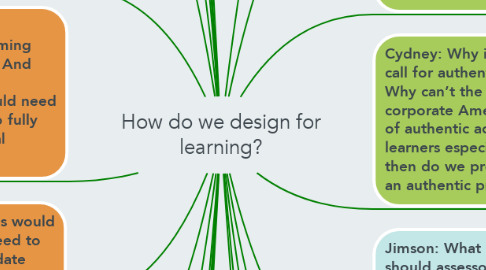How do we design for learning?
by Kelli Harris

1. Matthew: If teachers can vary anywhere from 50-98% in grading papers, should essay grading be abandoned altogether?
2. William: What is the role of an assessor? Are there elements of the ID role that you might feel less confident about? More confident about? Are there elements of ID work that seem more important than others?
3. Matthew: What are the priorities of teaching goals?
4. Matthew: Does VALUE solve the accountability problem? What criticisms are there of VALUE?
5. Cydney: As learning designers, how do we make sure students do not fall into the game/ mindset or mystery testing? How do we make sure teachers or program trainers do not fall into this type of test strategy?
6. Cydney: Why does VALUE place the judgment of learning in the hands of faculty and educational professionals? Shouldn’t students be the first ones to grade themselves before faculty and educational professionals?
7. Kelli: What might be needed to gain the support of faculty who are not interested in or motivated to change? How might more faculty be encouraged to take an interest in research related to learning in addition to research in their respective disciplines?
8. Kelli: What is the role of administrators in transforming the culture of education? And what would be needed institutionally or who would need to be involved in order to fully shift away from traditional assessment methods?
9. Kelli: What other practices would be affected and would need to be adapted to accommodate new assessment methods?
10. Jimson: Would thinking as an assessor help students to be more curious about threshold concepts?
11. Jimson: How does one define “mystery-testing”? What is its purpose? Are these often employed as high stakes assessment opportunities? What is the effectiveness of “mystery-testing” in improving students’ understanding?
12. Leqi: What are the differences between applying the VALUE rubrics, or other assessment methods, to a course-based and institutional level? What are some emphases and considerations?
13. Leqi: What are the challenges and difficulties when trying to align the VALUE difficulties with course goals/outcomes?
14. Leqi: What might other effective or creative course assessments look like?
14.1. Shekinah: How will grading and knowledge assessments be impacted as virtual learning increases globally?
15. Cydney: As learning designers, are we limited to the assessor approach or can also be an activity designer?
16. GAPS IN EDUCATOR ROLES
17. GAPS IN COURSE DESIGN
18. Spend 5 minutes on your own looking at the current map. In Groups: - Decide how you would evaluate Jimson's/Kelli's choice of groupings/synthesis. - Change the maps around to design a better synthesis, if any.
19. Matthew: If grades fail, what metric are these researchers using to seek reliable information about student learning? How much counter-evidence is there to this essay?
20. Cydney: Do you think accessors take a perspective of a humanistic approach of listening to the desired understanding from the learner?
21. Cydney: What desired to learn examples that you have heard from your learners? Also, do you think the desired understanding is an important piece of evidence to communicate with our clients? Why?
22. Cydney: Why isn’t there a greater call for authentic performance? Why can’t the education system or corporate America give an excess of authentic achievement to ALL learners especially BIPOC? How then do we present the learner as an authentic problem?
23. Jimson: What UbD questions should assessors ask when denoting the kind of grading they will employ for a given assessment? What questions should assessors ask to help them know their own blindspots?
24. Jimson: What is the relationship between power and testing/assessment?
25. Shekinah: How is a student’s self-talk impacted by traditional letter grades and/or written feedback?
26. Shekinah: Are written comments a waste of teacher time and energy or part of their responsibility to connect with each student in a way that encourages their individual success?
27. William: What might an ID name as the most important conceptions or habits that they had to rid themself of? What about those without a teaching background?
28. GAPS IN VOICES


